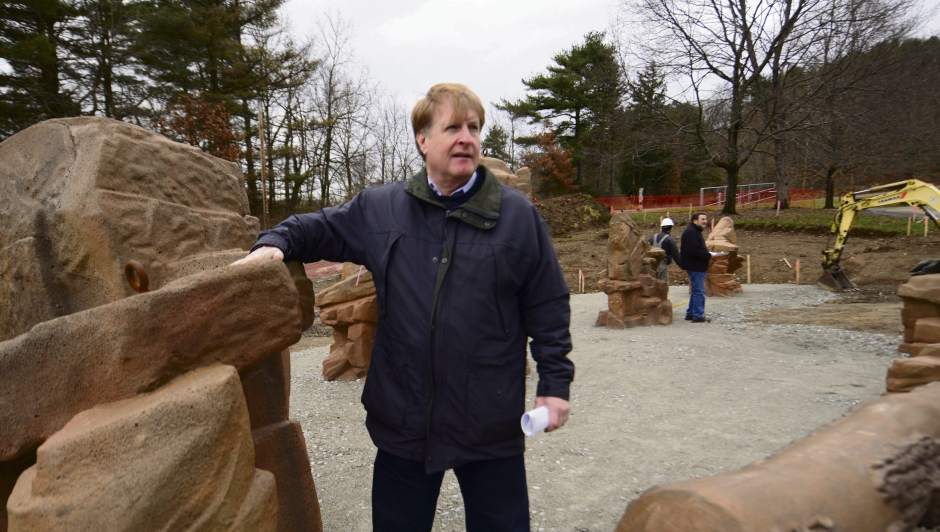Agreement contained “unprecedented protections” and latest proposed fracking ban “not good government”
A proposal to ban responsible, safe natural gas development from beneath county-owned lands is “not good government” and would harm Allegheny County citizens, Allegheny County Executive Rich Fitzgerald (D) said following a hearing last night.
“This premise that a ban keeps me or any other executive from authorizing drilling in our parks ignores the very documents that our government was founded on,” Fitzgerald said. “Focused on transparency and good government, the Home Rule Charter and Administrative Code ensure that no one decision maker would have the power or authority to make decisions like this alone.”
In 2014, Allegheny County voluntarily entered an agreement to develop natural gas more than a mile beneath the surface of Deer Lakes Park from adjacent private property. Allegheny County has realized more than $15 million in lease bonus and royalty payment revenue from the non-surface disturbance lease, MSC’s Callahan wrote in testimony to the council, with more than $3 million put toward park improvements including a new playground, shelter area and restroom facilities.
Thanks to the technological advancement of horizontal drilling, there has been no surface or environmental disturbance to the park as a result of the lease, allowing residents to continue to enjoy the park even during the temporary drilling phase.
Fitzgerald said in a statement that the county followed a transparent, public process that enabled them “to reach an agreement that provided unprecedented protections for the community.”
“It required air and water monitoring, placed limitations on noise and light pollution, restricted truck travel when schools were in session, provided for workforce development opportunities, and resulted in extraordinary investments in our parks and natural resources – protections, safeguards and benefits that would not have occurred if the county were not a party,” Fitzgerald said.
Through natural gas royalty revenues Deer Lakes Park has the largest playground in the Allegheny County parks system, officials said in 2017, with play areas for toddlers to teens, including rope and rock climbing, shade trees, green space, and native landscape plantings.
These direct economic, environmental and quality of life gains are why the Post-Gazette’s editorial board called moves to ban drilling “misguided.”
“Allowing private companies to retrieve shale gas from a mile underneath county parks does nothing to damage the public nature of the land itself,” the editorial board wrote in late 2021. “Despite the sincere but rather doomsday predictions of anti-drilling advocates, Deer Lakes has not only survived, it has thrived…It doesn’t necessarily violate our duty to steward public lands to allow shale gas to be extracted from beneath them.”
Cross Creek Park in Washington County has also thrived thanks to similar agreements the county entered to development natural gas beneath the park.
Natural gas development also takes place on Pittsburgh International Airport property, following a lease agreement involving the county’s input. Without natural gas development on airport property, “the airport would have been bankrupt [with] no flights, no cargo coming in or out, no reimagining of an airport to serve Pittsburgh, no Neighborhood 91 to further spur economic activity there,” Fitzgerald said.
“I would make both agreements again as they were the right things for the county at that time.”
A chorus of business and labor leaders have joined Fitzgerald in opposing the county’s ban, accurately pointing to experience as proof of responsible development.
“Everyone agrees that drilling and fracking should be done in a way that minimizes emissions and protects the environment. Responsible companies in the natural gas industry have shown that they do so,” Jeff Nobers, Pittsburgh Works Together Executive Director said. “Yet this ordinance would handcuff the elected officials of Allegheny County, including the members of the Allegheny County Council by limiting access to one of the most valuable natural resources in the world.”
Rather than advance a policy that directly harms Allegheny County citizens and eliminates any future development opportunity, the committee should forgo this proposal and focus on policies that encourage economic growth throughout the county.
“Maintenance of the status quo simply ensures that Allegheny County is well positioned to consider – on its own terms and conditions – whether any future development proposals would provide a public benefit to the citizens it represents,” Callahan said. “Adoption of this ordinance unnecessarily deprives Allegheny County and its citizens of this potential.”





